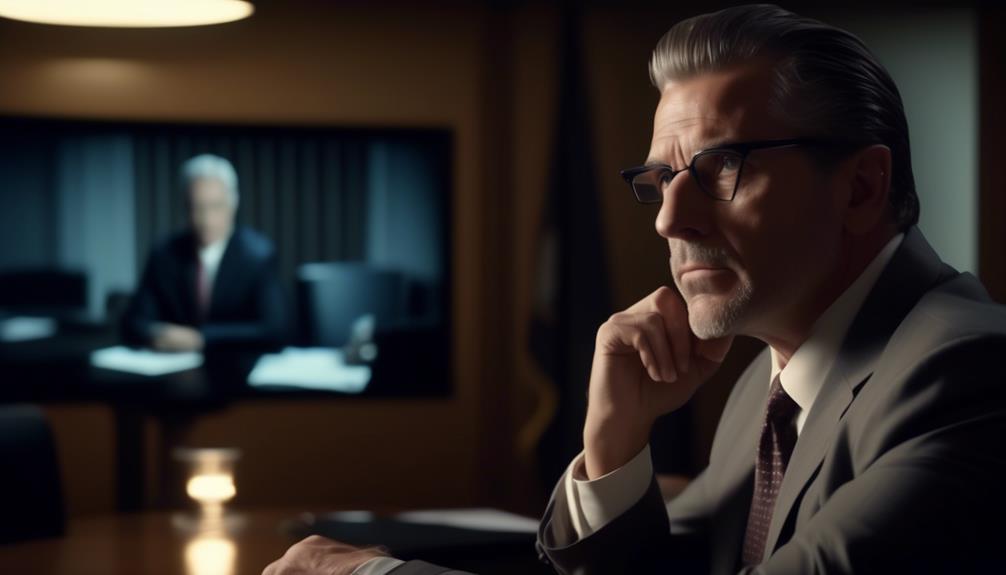In the world of legal proceedings, a video deposition is like a window into the truth, offering a glimpse into the details that can shape a case.
As an attorney, I've learned that mastering the art of video depositions is crucial for success. It's not just about asking the right questions, but also about creating an environment that helps witnesses open up and reveal their true selves.
From understanding the technical aspects to leveraging the power of video evidence, there are numerous effective strategies that can make all the difference in a case.
So, let's explore these strategies together and discover how we can unlock the power of video depositions to build a stronger case.
Key Takeaways
- Preparing for a video deposition requires having exhibits ready and organized, determining how to share them with the witness, establishing a schedule, and maintaining a clean and organized desktop.
- Building a strong connection with the witness is important, which includes introducing oneself, greeting the witness warmly, maintaining professionalism, and creating a distraction-free environment.
- Effective questioning techniques involve preparing exhibits in advance, following local rules and requirements, choosing a suitable location, and being prepared for technical issues.
- Managing technical issues requires testing audio and video quality, familiarizing oneself with the platform's features, having a backup plan, creating a distraction-free environment, and utilizing the court reporter's assistance for technical checks.
- Video depositions can be powerful evidence as they capture witness demeanor, hold the jury's attention, present testimony in a more engaging way, highlight inconsistencies in opposing counsel's witnesses, and enhance credibility while being cost-effective.
Preparing for the Video Deposition
When preparing for a video deposition, I always make sure to have my exhibits open and in order to save valuable time during the proceedings. This simple step can make a significant difference in the efficiency and effectiveness of the deposition process. By having my exhibits readily accessible and organized, I can easily refer to them when needed, without wasting time searching for documents or files.
In addition to having my exhibits prepared, I also determine how to share them with the witness. Whether it's through screen sharing or physically presenting the exhibits, I make sure to have a plan in place that allows for seamless and clear communication during the deposition. To maintain confidentiality and avoid revealing my strategy, I use generic names for exhibits, ensuring that their content remains confidential until the appropriate time.
Another crucial aspect of preparing for a video deposition is establishing a schedule for attorneys to ask questions. This helps to maintain order and efficiency during the proceedings, ensuring that each attorney has an equal opportunity to present their case and cross-examine the witness. By setting clear time limits and guidelines, we can avoid unnecessary delays and keep the deposition moving smoothly.
Lastly, I always ensure that my desktop is clean and organized when conducting a video deposition remotely. This not only enhances professionalism, but it also facilitates screen sharing and prevents distractions or confusion for all parties involved.
Establishing a Strong Witness Connection
To establish a strong witness connection, I prioritize introducing myself and cultivating rapport with the witness from the very beginning. In video depositions, especially remote ones, it's crucial to create an environment where the witness feels comfortable and at ease.
From the moment the video recording starts, I make it a point to greet the witness warmly and introduce myself, ensuring that they know who I'm and why I'm there. This initial interaction sets the tone for the deposition and helps establish trust and credibility.
Throughout the deposition, I maintain a professional demeanor and attire, projecting confidence and respect. This not only instills confidence in the witness but also conveys my commitment to the legal process.
Additionally, I pay attention to my surroundings and ensure a distraction-free environment. A quiet and organized setting allows for clear communication and prevents any disruptions that could hinder the witness's focus.
Furthermore, I take advantage of screen sharing capabilities, using a clean and organized desktop to display documents and exhibits. This showcases my preparedness and professionalism, making it easier for the witness to follow along and engage in the deposition.
Effective Questioning Techniques
Establishing a strong witness connection sets the stage for effective questioning techniques that elicit valuable information and support the overall case strategy. One effective strategy is to prepare exhibits in advance and establish a clear schedule for questioning. This helps to keep the deposition organized and ensures that all relevant topics are covered.
Additionally, it's important for attorneys to keep their video on and maintain professional decorum in behavior and attire. This helps to establish credibility and fosters a professional environment for the deposition. Attorneys should also familiarize themselves with local rules and state-specific requirements for remote depositions to ensure compliance.
Choosing a quiet and tidy location for the deposition is essential, and attorneys should be prepared for any technical issues that may arise. Dialing in early to confirm audio and video quality is crucial, and requesting virtual breakout rooms can be helpful for private discussions.
Managing Technical Issues
Managing technical issues during video depositions requires proactive preparation and a keen eye for potential disruptions. As attorneys, we must ensure a smooth and seamless experience for all parties involved. To achieve this, here are some tips for conducting remote depositions without any technical hiccups.
First and foremost, it's crucial to test the audio and video quality well in advance. By doing so, we can address any potential issues that may arise during the deposition. Familiarizing ourselves with the platform's features, such as screen sharing and virtual breakout rooms, can also enhance the overall experience and facilitate effective communication.
In the event of internet failures, it's essential to have a backup plan for an audio-only connection. This ensures that even if the video connection is compromised, the deposition can still proceed without major disruptions.
Creating a distraction-free environment is equally important. A tidy background and proper lighting not only enhance the overall professionalism of the deposition but also minimize any potential distractions that could hamper the proceedings.
Utilizing the court reporter's early availability for technical checks can be immensely beneficial. Their expertise can help identify any potential issues and provide the necessary support to ensure a smooth deposition.
Utilizing Video Depositions as Evidence
As attorneys, we must embrace the power of video depositions to present compelling evidence that captivates juries and adds valuable context to our cases. In today's digital age, it's imperative to leverage this innovative tool to enhance our trial strategy.
By creating a video deposition, we can effectively communicate the witness's demeanor and emotions, which can significantly impact the jury's perception of their credibility. Video depositions provide a visual representation that Court Reporters simply can't capture with their transcripts alone.
Not only does video footage hold the jury's attention, but it also allows us to present the witness's original testimony in a more engaging and dynamic way. By utilizing video depositions as evidence, we can demonstrate to the jury the witness's true character and demeanor during the deposition, providing a more accurate representation of their testimony. This visual element can be particularly impactful when cross-examining the opposing counsel's witnesses, as it allows us to highlight any inconsistencies or contradictions in their statements.
Furthermore, video depositions can be utilized at trial to reinforce key points and arguments. By presenting the video evidence to the jury, we can evoke emotions and create a lasting impression that's more powerful than mere words on a page. Video depositions not only enhance the credibility of our case but also provide a cost-effective and efficient way to present evidence.
Conclusion
In conclusion, attorneys must adapt to the digital age and master the art of video depositions. By preparing thoroughly, maintaining professionalism, and leveraging the benefits of video, attorneys can effectively capture the essence of witness testimony.
Technical considerations and remote deposition stipulations should also be taken into account to ensure a smooth process. With careful planning and execution, video depositions can be a powerful tool in the pursuit of justice.

